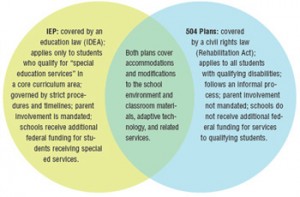Pursuing a 504 Plan
Your child was found to be ineligible for an Individualized Education Program (IEP) under the Individuals with Disabilities Education Act (IDEA). You’ve pounded the pavement and appealed the decision, but the school district will not declare your child eligible for special education. What’s next? You could consult a private speech-language pathologist (SLP). You could also pursue a 504 plan. A 504 plan is similar to an IEP. However, it’s covered under section 504 of the Rehabilitation Act of 1973, not the IDEA law.
Referral for a 504 Plan
Some school districts will automatically refer your child for an evaluation to consider eligibility for a 504 plan. If yours does not, submit a referral request in writing, keep a copy for your records, and send it via certified mail, return receipt requested.
Evaluation
After you request an evaluation, the school district will likely conduct an assessment, which is similar to the assessment for an IEP. The school district is not automatically required to evaluate each child referred for services; the Rehabilitation Act grants schools the right to deny requests. They must inform you in writing that they are turning down your request.
During the evaluation, the school district will consider whether your child has a speech disorder and the extent to which the speech disorder interferes with daily life, particularly learning. The operative words here are whether the speech disorder “substantially limits” your child’s “major life activities.” Major life activities include learning, hearing, and speaking. The school district will then determine the accommodations your child might need.
The evaluation team typically consists of you, a child specialist, your child’s teacher, the school nurse, and other professionals as needed. The team will consider school reports, teacher recommendations, and parental observations.
The 504 Plan
Just like an IEP, a 504 plan is an actual, written document that spells out exactly what services your child will receive and what accommodations he requires. When appropriate, your child might receive physical, speech, or occupational therapy. 504 plans also provide for classroom modifications that might be necessary for your child to receive a free, appropriate public education (FAPE). These might include preferential seating, grading adjustments, homework assignment adjustments, and modifications to testing techniques. Your child might also be given extra time to complete assignments. Unlike an IEP; however, if your child has a 504 plan, he is not considered to be a special education student.





